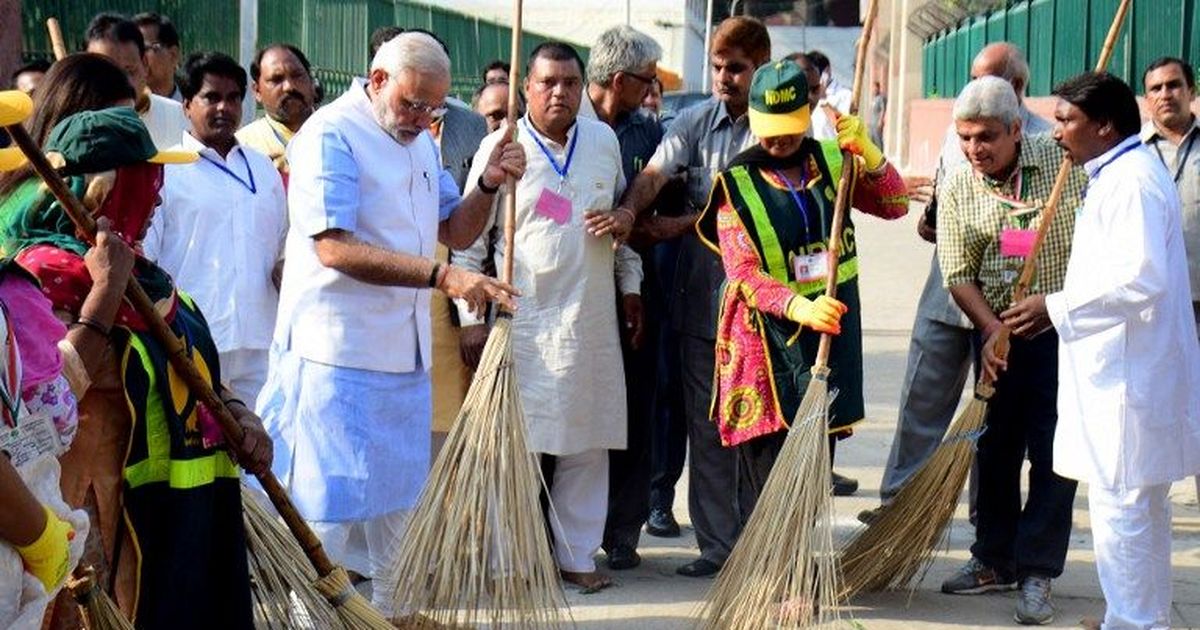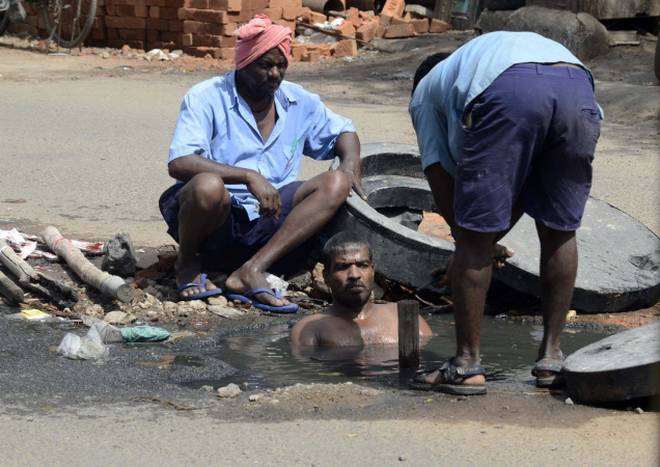Swachh Bharat Abhiyaan, incidentally launched on October 2, 2014, was a nationwide cleanliness campaign. It also included construction of toilets, maintenance of public sanitation and hygiene, and keeping the streets clean to name a few. Five years later, on October 2, 2019, PM Modi declared rural India free of open defecation. Nothing could be further from truth. Open defecation is a reality in not only rural but also urban areas. One crucial question has continued to glare in front of us – why is manual scavenging still being practiced?
What about manual scavengers?
SBA made the biggest of celebrities pose with a broom for photo shoots. Every other politician and actor began to hold a broom in their hand, pretending to clean a street already cleaned by a poor Dalit sanitation worker. But have any of these celebrities including the PM given a thought to the pathetic working conditions these sanitation workers and manual scavengers? The biggest shortcoming of SBA was precisely that it focused on the cleaning but not the slightest on who does the cleaning and in which conditions.
Manual scavenging includes removing human excreta with bare hands from dry latrines. In addition, there is manual cleaning of drains, septic tanks, sewer lines and latrine pits. This is done under unsafe conditions with the risk of death due to asphyxiation or choking. They might not be provided adequate safety equipment. In fact, there are instances when they have to consume large quantities of alcohol before entering the pit or drain to be able to bear the smell. This further risks their life.
Manual scavenging was outlawed in 1993 itself. It violates right to life as well as equality. Manual scavengers enjoy neither dignity of labour nor a respectable status in society. Yet, the inhuman practice continues. Despite a 2003 petition by Safai Karmachari Andolan for implementation of the ban and later cases in Gujarat High Court (2004), Delhi (2007), and Chennai (2008), why are manual scavengers still dying? 282 people died in the past four years, which is also considered a gross underestimate. The actual number could be more than a thousand. This is a serious issue concerning human rights. Sewage operations need to be entirely mechanized to avoid such degrading working conditions.

The Prohibition of Employment as Manual Scavengers and their Rehabilitation Act, 2013, was a more comprehensive law. The state was asked to provide monetary compensation of ten lakh rupees for sewer deaths since 1993, even if the worker was privately employed. In most places, sewers or drains are not in proper state. But what about those who are lucky enough not to die but continue to live and perform this degrading work every other day? Should they die for their plight to be taken into cognizance? Why has SBA not included decent work, better conditions, and higher wages for manual scavengers? It is clear that despite judiciary interventions, manual scavengers continue to suffer.
Cast away by caste
Caste may no longer be the organizing principle of the labour market in the general sense. However, the lower the worker in caste hierarchy, the more lowly the nature of work. It is the Atishudras who tend to be manual scavengers. They are considered to be impure and untouchables. The caste practicing manual scavenging ‘Bhangi’ is often colloquially used as an abusive word. Those who do not approve of affirmative action argue that unless reservations are done away with, caste will not disappear. But one need not study much to know that caste-based practices such as manual scavenging still continue. If that persists, how will caste be annihilated? To do away with caste, one needs to do away with what Nicholas Dirks has termed as castes of mind. Until manual scavenging continues, ideas of purity and pollution will keep colonizing our minds. We will not look at them as humans but impure, lesser beings.
Being born in a particular family is only a biological accident. Is it then right to discriminate against people born in a backward caste? Given a choice, nobody would ever want to be a manual scavenger. This livelihood pattern emerges from abject poverty and no freedom of choices. Lack of education, extremely poor socio-economic background, no access to other economic opportunities and the stigma of being born in a particular ‘impure’ caste are larger social factors pushing someone towards working as a manual scavenger. They are truly cast away by their caste and are never considered equal members of the mainstream society. Their social exclusion alienates them not only from fellow human beings but also from themselves.
Their lives matter
Public hygiene and sanitation is important. But for a progressive society, cleaning our minds from the garbage of caste prejudices is equally important for ensuring a dignified life for manual scavengers. India cannot be swachh unless its people commit towards creating a more humane society for everyone. Every manual scavenger in the country has a right to life with dignity. They must be provided proper safety equipment and social insurance because of the perilous nature of the work they perform. This is their right and not an obligation that they ask for. Their livelihood cannot become a death call for them.
Employers must take the responsibility of providing them enough safety gear. They must be held accountable and punished if any of their employees dies during work. They cannot exploit workers by paying them a pittance and making them work in an unsafe environment. They cannot make them risk their lives for the sake of money. Workers are also humans and that cannot be denied by employers, state, or the courts. We cannot claim to be in the 21st century if such regressive and dehumanizing practices go on in our society in front of our eyes. All lives matter, and so do those of sanitation workers and manual scavengers. Not being cognizant of that is not only a violation of human rights but a crime against humanity itself.








